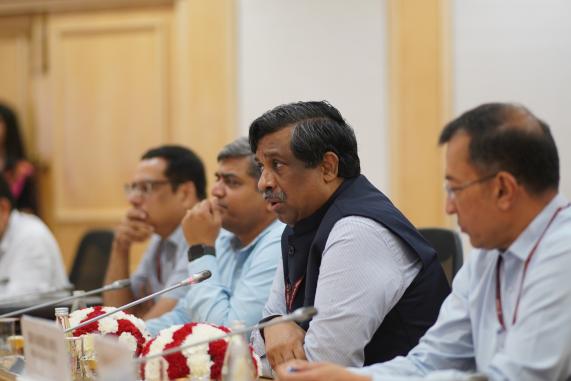
IIT Madras’ Centre of Excellence for Road Safety launches Data-Driven Hyper-Local Interventions in 100 Districts across 17 States
- 21st May 2025
-
Press Release
Indian Institute of Technology Madras’ (IIT Madras) Centre of Excellence for Road Safety (CoERS) has launched a landmark ‘Data Driven Hyperlocal Intervention’ (DDHI) programme to address road crashes across India.
Taken up under the aegis of the Ministry of Road Transport and Highways (MoRTH), this initiative prioritises 100 districts identified as high accident-burden zones through comprehensive analysis of national crash data.
The DDHI alignment session-cum-launch event was organized at Vigyan Bhawan, New Delhi, on Tuesday (20th May 2025) with presence of leaders and officials from Central and State Governments besides districts.
According to the MoRTH’s “Road Accidents in India 2022” report, there were 4,61,312 reported accidents, resulting in 1,68,491 fatalities and 4,43,366 injuries. While many of these accidents were attributed to human error, a significant proportion are due to localised challenges.
To address these challenges, the top 100 districts have been prioritised for intervention. The approach will be tailored to the local needs of each district and aligned with the CoERS’s 5E model of road safety – Engineering, Enforcement, Education, Emergency Care, and Empathy.
This initiative will adopt a bottom-up approach, empowering District Road Safety Councils (DRSCs), led by the respective chairperson, to lead decision-making and implementation. The DDHI framework empowers councils to design targeted interventions tailored to district-specific road conditions, behavioural patterns, and geographical constraints.
Lauding this initiative, Shri Nitin Gadkari, Hon’ble Minister for Road Transport and Highways, said, “Road safety needs a whole of system approach with support from stakeholders across all levels of government. Real change happens when data empowers the district authorities to act upon accident spots. I congratulate the CoERS at IIT Madras for developing a scientific framework, technological tools for ready consumption of law enforcement agencies across the country”
Speaking at the occasion, Shri V. Umashankar, IAS, Secretary, MoRTH, said, “There are multiple factors contributing to every accident. Each accident has a story behind it and unravelling that story is best done by the local level. This initiative marks a paradigm shift in how we address road safety — by empowering districts with actionable insights and decentralised tools. With the right data, leadership and community engagement, we can reduce preventable fatalities and make our roads significantly safer for every citizen.”
Further, Prof. V. Kamakoti, Director, IIT Madras, said, “At IIT Madras, we are committed to leveraging technology and data science to solve real-world problems. The CoERS initiative is one such example that attempts to look at accident data to come out with scientifically backed recommendations that can enhance road safety.”
CoERS has collaborated closely with MoRTH and State Governments to develop a scalable, evidence-based strategy, underpinned by data from the electronic Detailed Accident Report (eDAR), formerly known as the Integrated Road Accident Database (iRAD), and powered by Sanjaya, a location intelligence platform launched by Shri Nitin Gadkari., Hon’ble Minister for Road Transport and Highways.
Shri Mahmood Ahmed, IAS, Additional Secretary, MoRTH, said, “Periodic Road Audits are necessary at all stages, i.e. Design, Construction & Maintenance of Roads.
The criticality of ensuring data quality in eDAR may be stressed to all concerned. This will help plan targeted interventions. It is not only road engineering but also vehicle engineering which is equally important. Ensuring structural integrity of vehicles is a key focus area by MoRTH.”
Elaborating on the need for such initiative, Prof. Venkatesh Balasubramanian, Head, Centre of Excellence for Road Safety (CoERS), IIT Madras, said, "India’s road safety challenge requires contextual, grassroots-level solutions backed by robust data and scientific insight. Through this initiative, we aim to empower district leadership with practical tools and capacity-building support that integrate human factors and data driven interventions to deliver measurable improvements in road safety outcomes."
Key Objectives of the DDHI Programme include:
O Build capacity and capability within selected districts.
O Empower district leadership to identify and implement critical road safety interventions.
O Enable sustainable, low-cost, high-impact solutions that are community-informed and data-backed.
O Establish scientific impact assessment and review mechanism for the interventions taken up.
O Create a repository of best practices and learnings resulting from DDHI for other districts to learn and replicate.
Some of the tools and frameworks that CoERS will provide to DRSCs include:
O Sanjaya Dashboard – a comprehensive crash visualization and planning tool to perform interventions.
O Field Perception Survey (FPS) – a grassroots data collection app to identify perceived road safety hotspots.
O Trauma Care Preparedness Level (TPL) – an assessment app to evaluate and plan for emergency care infrastructure and readiness.
Additionally, a district-level operations taskforce will be constituted to ensure efficient data collection, identify intervention opportunities and implement engineering, enforcement, and emergency care solutions. Periodic impact assessments will track the effectiveness of the interventions.
ABOUT CENTRE OF EXCELLENCE FoOR ROAD SAFETY (COERS)
The Centre of Excellence for Road Safety (CoERS) at IIT Madras is funded by the Ministry of Road Transport and Highways (MoRTH), Government of India, to perform evidence-based integrated approach to Road Safety. CoERS works on various aspects of human factors engineering, road engineering and vehicle engineering to bring about significant improvements in road safety globally. This CoERS also advices various stakeholders and Governments to bring about a data-driven systems approach to road safety.

